LIVING EVITA LOCA
Sir Andrew Lloyd Webber – together with lyricist Tim Rice – released the Evita “rock opera concept album” in 1976, a few years before the first theatrical production came to life on the West End and ultimately Broadway, a production that I vividly remember. It was truly exhilarating to witness Patty LuPone and Mandy Patinkin’s electric star turns, Hal Prince’s glorious broad-stroke staging, and the very talented Larry Fuller’s choreography – which rarely slowed long enough to let you consider the short-comings of the material. It won just about every major award that year, yet was never given a Broadway revival. The production that recently opened at the Marquis Theatre, for better and truly worse, has changed all that.
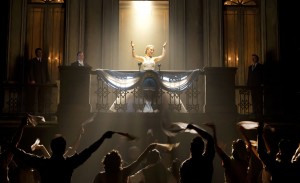
For those very few people who may not know, Evita concentrates on the life of Argentine political leader Eva Perón, the second wife of Argentine president Juan Perón. The story follows Eva’s early life, rise to power, charity work, and eventual death. In Rice’s libretto for Evita, while not completely historically accurate, she is an appealing main character for a musical: larger than life, sometimes opportunistic, sometimes altruistic, and always divisive.
This current version elucidates just why a revival has been delayed: any decent production of Evita is going to be expensive and the already demanding main character roles will have to be A-list stars to fill the seats at the Marquis (a strong singing and dancing ensemble is called for as well). West End phenomenon Elena Roger was announced for the title role – a real Latina playing musical theatre’s favorite Latina diva – but what about Che, the powerhouse narrator of the piece?
Enter Ricky Martin, good looking pop icon and Latin music’s Global Ambassador. To the producers, Martin’s job is simple: step into the role of Che, make it his own, and put enough butts in seats to assure a profitable revival. I’m a fan of Ricky Martin, who hasn’t been on Broadway since he appeared as Marius in Les Misérables sixteen years ago, so it pains me to admit that Mr. Martin just doesn’t have the chops to play Che. Oh, his voice is warm and he sings the notes beautifully, orchestrating the rock breakout moments like a pro, but he isn’t much of an actor. He gestures and indicates lyrics when he should trust the words and stand still to sell the songs. His Che is void of the rich inner life a real actor would create, which is key to basic storytelling onstage.
In Michael Grandage’s revival, Martin’s Che has been restored to the Greek Chorus role of the original text. He is no longer the historical Che Guevara of Prince/Patinkin renown. Martin’s Che is a socially conscious Everyman, full of disdain for the social climbing Eva Peron. What gets lost is Che Guevara’s righteous indignation at Eva Peron’s betrayal of her Marxist roots. Martin struggles mightily to play this generic version of Che, so it’s likely that the choice to play the character with crossness and resentment might have turned a mediocre performance into a train wreck. And yet, to the producers, Martin is doing more than a great job as Evita is currently one of the hottest tickets on Broadway.
Elena Roger turns out to be a fascinating Eva Peron. For a tiny woman, she has an exceptionally powerful singing voice, but not quite powerful enough to deliver some of the higher sustained top notes. Instead of knocking her ballads out of the park, she sends grimaces through the audience as her big final notes often land flat or sharp. Her mid and low-ranges, however, are a perfect fit for the role. It is undeniably lovely to hear the Webber & Rice score flavored with an authentic Argentine accent, and what Roger lacks in upper register, she makes up for in her dancing and acting. She is a spitfire when she tangos, makes love, and manipulates all those around her. When Roger struts her stuff downstage she truly lights up the auditorium with “star quality.” With a little more vocal confidence, Roger has the potential to be a top-notch, old-fashioned triple-threat.
The rest of the cast is pitch-perfect. Michael Cerveris brings his first-rate Broadway talents to the role of Peron, re-affirming his place as one of the best leading men on the Great White Way. Rachel Potter delivers the Mistress’ ballad, “Another Suitcase in Another Hall,” with the perfect blend of self-knowledge and heartbreak. And Max Von Essen finds the right essence of Magaldi, a paradox of casting as the actor must be very skillful at portraying a mediocre talent. A solid ensemble supports the proceedings with no stand-outs, as is proper.
Michael Grandage’s direction feels like staging without much of a point of view. His concept for Martin’s Everyman/Che lacks impact and resonance, as does most of the production. Because most of Evita is music-driven, Grandage wisely defers to talented choreographer Rob Ashford who keeps the proceedings moving at a brisk pace.
The show’s design can be summed up as uninspired. Blue curtains and giant disembodied bust portraits of Eva and Juan Peron greet you like souvenir altar cards before the show begins. This irony is never fully explored in the design. Christopher Oram’s two-tiered set is too literal: his underground caverns imply subterfuge and secret agendas, but as these themes are overtly explicated in the book, Oram’s caverns render the set redundant. Oram’s costumes hit their mark with the exception of the “well-to-do” ensemble members, who seem more middle- than upper-class. Aside from Mawbry’s fun progression of wigs from black to blonde, ones that fit snugly with Eva’s rise to power, the design team has created an evening that looks more like a competent regional production than a top-notch Broadway revival.
Without the legerdemain of great leads, design, or direction, we are left to contemplate the score and libretto. Every so often, one of the recitative sections sounds a little too close to Joseph and the Amazing Technicolor Dreamcoat or Jesus Christ Superstar, the two prior shows in the Webber & Rice oeuvre. It cannot be denied that “Don’t Cry for Me Argentina” is one of the great set pieces in musical theatre. Grandage is respectful of the moment, taking his time first to let the famous balcony glide gracefully forward downstage, then to have the transformed Eva appear like a spirit, and finally to allow the song to come forth unadorned.
I was also delighted to get reacquainted with so many of the show’s other songs that have found their way into the canon. Even though Webber had not quite reached the peak of his powers with Evita, he had learned to write eclectic music without the show feeling too pastiche. He had mastered wrapping an entire score around the strains within a full, thematic melody. Say what you want about Webber as a commercial sell-out, he writes an authentic composition – all the way to the bank. Tim Rice’s words remain efficient, often sly and witty. The lyrics in “Rainbow High” (“Christian Dior me,” “Machiavell me,” “Lauren Bacall me”) all still land with a clever splash on the down-beat.
Unfortunately, in the end, it is the source material that undermines the rise of both Evita the musical and Eva the lady. Towards the end of Act Two when Juan breaks through Eva’s denial to confront her about her fatal illness, any hope of a theatrical dramatic story dies. Illness here is no substitute for dramatic action, and Eva’s death leaves the evening with no place to go in terms of a dramatic incident. Webber & Rice could have written Eva one last power ballad; instead, they give her “Eva’s Final Broadcast” which is no more than a reprise of “Don’t Cry For Me, Argentina,” an appropriate reprise, but in the end, a missed opportunity for a truly transcendent moment. Quibbles aside, it’s hard to leave any production of Evita without the Webber melodies still playing in your head.
The litmus test for any revival comes down to a question of relevance. When Evita first appeared, the story of a promiscuous woman sleeping her way to the top felt somehow connected to the cultural conversation as HIV was beginning to make its despised appearance. Today the story of an ambitious woman using her sexuality to get ahead seems trite and quaint. As characters, neither Eva nor Che ever achieve the combination of scenery chewing and emotional satisfaction to enter the pantheon of great musical theatre characters, i.e. Mama Rose, Sweeney Todd, or even Annie Oakley. Unless producers find performers who can deliver power-house star-turns worthy of the ranks of LuPone and Patinkin, it’s best to let Evita stay buried along with Eva Peron.
photos by Richard Termine
Evita
Marquis Theatre
closed on January 26, 2013 (337 performances)
for tickets, visit EVITA
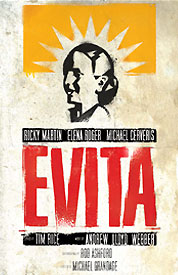
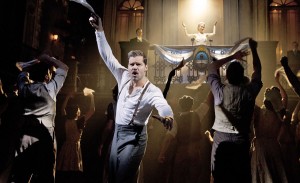
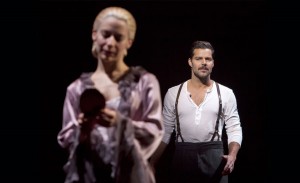
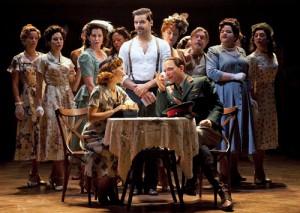
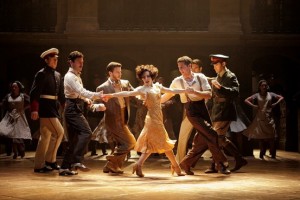
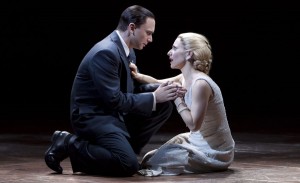
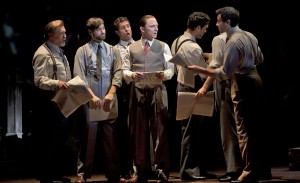
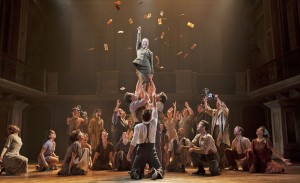
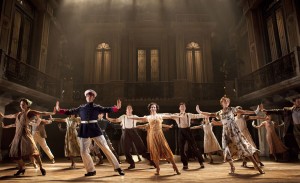
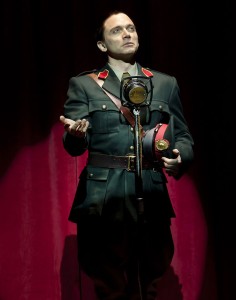

{ 1 comment… read it below or add one }
Saw the production on April 21. While it was a somewhat enjoyable production it lacked strength and character of the original play. When paying top ticket prices we were underwhelmed with the performance of the cast.